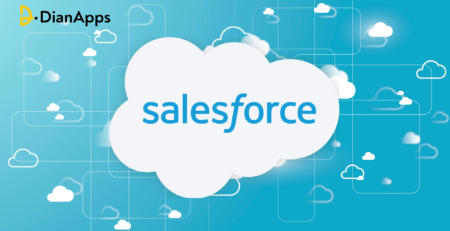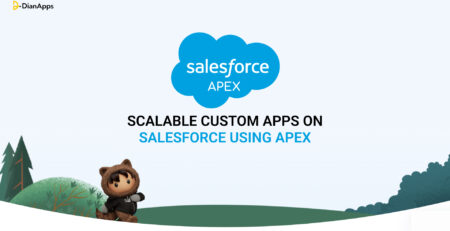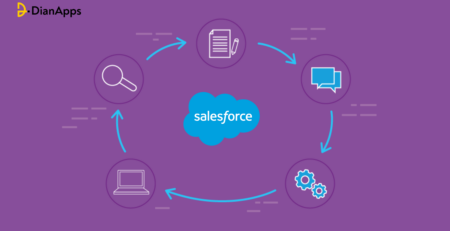A Comprehensive Guide To Salesforce Cloud Types
Salesforce is the world’s most popular CRM development platform that can help businesses of all sizes manage and grow their customer relationships. Now, it has not only been limited to enhancing customer experiences but has also become a leader in cloud computing.
It offers a variety of different cloud types to meet the specific needs of different organizations. In this guide, we will explore the different Salesforce Cloud Types and provide you with an overview of the features and capabilities of each one.
Whether you are just getting started with Salesforce or looking to expand your existing Salesforce implementation, this blog will help in all aspects to make an informed decision.
Types of Salesforce Cloud
1. Salesforce Sales Cloud
Salesforce Sales Cloud is a cloud-based customer relationship management (CRM) solution that helps sales teams manage and grow their customer relationships. It provides a variety of tools and features to help sales teams streamline their processes, increase productivity, and close more deals.
Feature of Salesforce Sales Cloud Integration For Your Business
- Contact & Account Management: It allows sales teams to easily manage their contacts and accounts, including detailed information about each customer, such as their contact information, purchase history, and communication history.
- Sales Forecasting: It includes powerful forecasting tools that allow for predicting future sales and revenue.
- Lead Management: This CRM platform provides a streamlined process for managing leads, from initial contact to conversion.
- Sales Automation: It automates many of the tasks associated with sales, such as sending emails, scheduling appointments, and tracking customer interactions.
- Mobile Access: It provides mobile access to all of its features, allowing sales teams to access customer data and manage their deals from anywhere.
2. Salesforce Service Cloud
Salesforce Service Cloud is a CRM platform for customer service and support solutions that helps businesses to manage and improve their customer service operations.
It allows users to automate service processes, smoothen workflows, and emerge with key topics, articles, and experts to assist customer service agents.
Feature of Salesforce Service Cloud
- Knowledge Management: It provides a centralized repository for customer service teams to store and share information, such as frequently asked questions and best practices.
- Omnichannel Support: Salesforce Service Cloud supports multiple channels of customer communication, such as phone, email, chat, and social media. This helps customer service teams to respond the customers quickly in their preferred method.
- Automation: It automates many of the tasks associated with customer services, such as case routing, escalations, and notifications.
- Case Management: It allows the management of customer inquiries and issues such as status, priority, and resolution history.
3. Salesforce Marketing Cloud
It is a suite of tools and services that allows automating and managing marketing efforts across multiple channels including e-mail, mobile, social, and web. You can grow your business rapidly by using Salesforce Marketing Cloud.
Some of the key features of this CRM platform include:
Features of Salesforce Marketing Cloud
- Email Studio: It is a powerful email marketing tool that allows to create and send personalized, targeted email campaigns to their customers and prospects.
- Interaction Studio: It is a tool that enables the creation of personalized and targeted web experiences for visitors to their websites.
- Einstein AI: It is a suite of AI-powered tools that provide businesses with insights and recommendations to optimize their marketing campaigns.
- Social Studio: It is a social media management tool that allows publishing, monitoring, and analyzing social media analytics across multiple platforms.
- Journey Builder: It is a tool to create personalized customer journeys across multiple channels, such as email, mobile, and social.
4. Salesforce Commerce Cloud
Salesforce Commerce Cloud is a cloud-based e-commerce platform that unifies the way businesses use to create, manage, and optimize their online sales channel. It can be used to create engaging and personalized shopping experiences.
Features of Salesforce Commerce Cloud
- Searching & Merchandising: It allows businesses to improve the search and navigation experience for the customers on their e-commerce website, including the ability to create search filters, manage search results, sort options, and product recommendations.
- Marketing & Promotions: It is a set of tools used to create and manage marketing campaigns and promotions.
- Analytical & Reporting: It provides businesses with detailed insights and analytics about e-commerce websites likewise sales performance, website traffic, and customer behavior.
- Order Management: It can be used to manage and fulfill customer orders. Also, it can track inventory levels and shipping status.
- Catalog Management: It is a tool that can be used to manage product catalogs, product categories, attributes, and product pricing.
5. Salesforce Experience Cloud
Salesforce Experience Cloud is a suite of customer experience management tools widely used by a Salesforce Consulting Company. Basically, it is designed to help organizations create personalized and seamless experiences for their customers across all touchpoints.
Features of Salesforce Experience Cloud
- Community Cloud: This component is a platform for building and managing online communities for customers, partners, and employees.
- Analytics Cloud: This is a platform used for analyzing analytics dashboards and reports.
- Marketing Automation: These tools can be used to automate marketing campaigns such as social media, email, and mobile marketing.
- Integrations: The salesforce experience cloud can be integrated with other third-party apps and services to offer a complete view of customer interactions and data across varied channels.
6. Salesforce Analytics Cloud (Wave Analytics)
Salesforce Analytics Cloud, also known as Wave Analytics is a business intelligence platform provided by Salesforce. It can be used to analyze and understand large amounts of data in order to make data-driven decisions.
Features of Salesforce Analytics Cloud
- Salesforce Wave: It is a cloud-based data analytics platform that can be used to charts in Google Sheets.
- Prediction Builder: It is used to create predictive models with minimal coding and data science knowledge.
- Salesforce Reports & Dashboards: It is a set of built-in reporting and visualization tools that are used to create dashboards and share reports.
- Salesforce Dataflow: It is a feature that allows businesses to create and manage dataflows, which are used to extract, transform, and load data into Salesforce.
- Outlier Detection: It allows the detection of outliers, anomalies, and patterns in the data to uncover hidden insights.
Other Types of Salesforce Clouds
1. Salesforce Nonprofit Cloud
Salesforce Nonprofit Cloud is a suite of tools and solutions specifically designed to help nonprofit organizations manage their operations and better engage with their stakeholders. This cloud-based platform is based on the top of the Salesforce CRM platform.
The Nonprofit cloud includes several key components:
- Nonprofit Success Pack (NPSP): This component is a set of pre-built objects, fields, and configurations that are tailored to the needs of nonprofit organizations.
- Salesforce Philanthropy Cloud: This is a platform used for managing major gifts, grants, and planned giving. It includes tools for tracking donor interactions, managing donor relationships and creating custom reports.
- Salesforce Einstein: This is a set of artificial intelligence and machine learning tools that can be used to gain insights from nonprofit data and make better decisions.
2. Salesforce Financial Services Cloud
Salesforce Financial Services Cloud is a customer relationship management (CRM) platform specifically designed for financial services companies. It is widely used across various areas of financial industries.
It will prove beneficial for financial firms in many ways including
- Compliance Management: It provides tools such as compliance monitoring, reporting, and alerting for managing regulatory compliance.
- Advisor Management: It can be used to manage advisor productivity including lead management, pipeline management, and performance monitoring.
- Analytics & Insights: This component can be used to gain insights from customer data.
3. Salesforce Education Cloud
This cloud-based solution is specifically designed for the education industry. It can help educational institutions such as schools, colleges, and universities to manage their operations and better engage with their students, faculty members, and other stakeholders.
- Recruitment Made Easy: It enables institutions to deliver a relevant and proactive outreach to prospective students. As all the data is consolidated in one place, it can be used to recruit the right candidates, increase recruiter productivity, and boost performance.
- Student Relationship Management: It provides tools for managing student information, tracking student progress, and communicating with the students.
- Multi-department Collaboration: Different departments in a campus need to work together to make things run smoothly. Here education cloud helps to provide a smooth and seamless experience for students by connecting all the different departments.
4. Salesforce Manufacturing Cloud
Salesforce Manufacturing Cloud was specially launched for the manufacturing industry. It allows sales and operational teams to collaborate more effectively through solutions like sales agreements, account-based forecasting, community cloud, einstein analytics, and rebate management.
Some of its key features include:
- Einstein Analytics For Manufacturing: It is a customized platform that can be used to gain insights into sales agreements, product performance, and pricing. Also, businesses can use this to keep track of their accounts, income distributions, and a comparative analysis of anticipated sales.
- Community Cloud: It provides a platform to interact and collaborate with all the stakeholders of a business.
- Sales Agreements: This feature helps both manufacturers and buyers to keep the negotiated terms organized and get the most recent updates on the same.
5. Salesforce IoT Cloud
Salesforce IoT helps businesses to monetize their IoT investments by transmitting data created by access points directly through Salesforce. It can also be integrated with other Salesforce products, such as Sales Cloud, Service Cloud, and Marketing Cloud to deliver the best Salesforce development services.
Now, some of its advantages include
- Advanced Analytics: Salesforce IoT cloud uses Einstein analytics cloud to gather and process data from a range of sources including sensors, hardware components, portals, salesforce CRM, and ERP.
- It enhances the customer experience and provides exceptional services.
- It boosts sales and establishes IoT interaction guidelines.
- Lastly, it foresees and diagnoses problems.
6. Salesforce App Cloud
Salesforce App Cloud is a platform for building and deploying custom applications on the Salesforce platform. It allows Salesforce developers to focus on building solutions rather than infrastructure.
This includes several key components.
- Heroku: It is a cloud-based platform that allows developers to build, run, and scale custom applications in a variety of programming languages such as Java, Ruby, and Python.
- Salesforce DX: This includes a set of tools and technologies for developing and deploying Salesforce applications.
- AppExchange: This component is a marketplace for Salesforce applications where developers can publish and share their custom applications with other Salesforce customers.
- Mulesoft: This can be used for integrating Salesforce with other systems and data sources including APIs and connectors.
7. Salesforce Health Cloud
This platform is specifically designed for healthcare organizations that can help in managing doctor-patient interaction and record keeping. It streamlines operations and improves the overall patient experience in many ways.
Want to know how? So, Keep reading the blog!
- Care Team Collaboration: This feature provides tools for managing care teams, including care coordination, care plans, and task management.
- Automation: Through its easy-to-use dashboards and automated forms, mistakes are reduced and activities are automated.
- Personalization: It allows patients to see their whole health history, contact information, insurance plans, previous health insurance comparison
, and prescriptions. - Integration With EHR (Electronic Health Records): Salesforce Health Cloud integrates with EHR to offer a centralized view of all tasks and goals connected with various treatment plans. With this feature, health records can be managed more efficiently.
8. Salesforce Integration Cloud
Salesforce Integration Cloud is a set of tools and services provided for Salesforce development services. It allows businesses to integrate their various systems and data resources with Salesforce. This can include integrating CRM data with other business systems such as ERP, finance marketing, automation systems, as well as external data resources such as social media and databases.
- Salesforce B2B Commerce: Allows businesses to connect their e-commerce systems to Salesforce, enabling them to manage their online sales from within Salesforce.
- Salesforce Connect: Through this feature, external data sources can be accessed and queried directly from Salesforce, providing a single source of truth for all of a business’s data.
- Salesforce Data Loader: It is a tool used for loading large volumes of data into Salesforce.
- Salesforce Mulesoft: It is an integration platform that allows businesses to connect their apps, data, and devices in a unified way.
- Salesforce Lightning Connect: It is a real-time integration solution that allows external data to be accessed and updated directly from Salesforce, without the need for data replication.
Conclusion
In conclusion, Salesforce offers a wide range of cloud solutions to meet the diverse needs of businesses. Whether you are looking for CRM development solutions, a platform for building custom applications, or tools for integrating your systems, Salesforce has a cloud type than can help.
Although, Salesforce is continuously evolving its services and launching new products, it is important to consult with a reliable Salesforce consulting company like DianApps to leverage the best of the platform.
So, what are you waiting for?
Get in touch with us today and schedule a chat with our experts. Our collaboration will definitely be a success!




